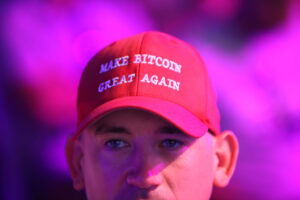In early August, thousands of Kenyans queued up in Nairobi to have their eyeballs scanned by an ominous silver orb, in a Faustian bargain with Open AI chief, Sam Altman. In exchange for handing over their biometric data — or, as Altman’s company puts it, “verifying your uniqueness” — users received 25 free “Worldcoin” crypto tokens, worth approximately $50, which would be transferred directly via Kenya’s mobile payments app, M-Pesa.
If it sounds too good to be true, that’s because it is. Altman has promised that his Worldcoin project, which he eventually hopes to roll out around the globe, will bring millions of “unbanked people” — that is, people without bank accounts — into the economic and biometric fold. But his Orwellian scheme will likely do more harm than good to the most financially vulnerable people on the planet. Despite the word “coin” in the title, it’s unclear whether Worldcoin is trying to create digital money — or to colonise global identity. Or perhaps it is angling to do both.
This lack of transparency may explain why the Kenyan government pulled the plug on Worldcoin’s operations less than a month after the coin launched. On 2 August, it called a halt to the great data onboarding, questioning the legality of Worldcoin’s biometric and data collection practices. But this was only after 635,000 Kenyans had signed up: surrendering their data to the unknowable intentions of a Silicon Valley tech bro.
While it may have provoked the most media controversy, Worldcoin isn’t the first project of its kind: nearly every major digital platform will now trade your digital identity for “tokens”. And by tokens, I mean money-like things ranging from airtime credit and loyalty points to game tokens, customer data and gift balances. Tokens have always ghosted the economy of publicly mandated currency, but now they are coming to the fore, threatening to replace money itself. It raises the question: was money only ever a blip?
Tokens are different from “real” money in a number of ways. If money is at least in theory fungible — one dollar is supposedly the same as any other — tokens have limited fungibility: they come with strings attached, rules about who can spend them, where, and when. Many tokens, like Worldcoin, make identity a prerequisite for a transaction. In 2016, when The Orb was just a twinkle in Altman’s verifiably unique iris, the World Food Programme trialled a system that issued relief payments through the use of biometrics. The system allowed refugees to buy items from participating stores using their biometric data as a credential: all they needed to do was scan their iris to pay for an item. The idea was to prevent fraud — and to ensure that those availing themselves of the programme were “worthy” of relief in the first place.
Amazon uses a similar strategy, paying its Mechanical Turk workers outside of the US and India in gift balances. This balance is non-transferable: it is tied to the workers’ identity and can only be redeemed through the Amazon store. The token thus keeps the flow of value in a closed loop.
The token system restricts people’s freedom of choice — the ultimate weapon for the nanny state and Big Tech corporations alike. In the United States, for instance, food stamps (now called SNAP benefits) come pre-loaded onto an Electronic Benefits Transfer (EBT) card. These tokens can be used for fresh food and produce, but not for alcohol, tobacco, or hygiene products such as tampons, vitamins or medicines. They can be used for cold deli food, but not for hot meals. Why cold pre-cooked meat but not half a rotisserie chicken? It seems there is something too “easy” — too idle, maybe — about buying a hot meal for your family using benefits.
Another way in which tokens are different to money is that they are able to communicate not just the terms of an exchange but additional values and criteria alongside a transaction. Sometimes these other things are a bit of fun — game tokens and NFTs are used to flex and brag, emotes are used to joke and troll, and even Dogecoin was used to tip other users for being funny on the internet before Elon Musk bought some for his children and catapulted the token into speculative stardom. Funny, that. But sometimes it’s not so fun: while money codifies exchange value, tokens are also used to survey, to remember, to calculate and to programme values into our exchange media.
As more and more of our money shifts from the coins, notes and bankcards we carry around in our pockets to tokens that ride the rails of information and communications technologies, our exchange media is becoming programmable. This means that — unlike cash, which is an anonymous bearer instrument — every digital transaction carries a range of transactional data about where it is spent, and by whom. Tokens can also be programmed to specify not only an exchange value, but a whole range of other terms and conditions that must be met before an exchange will take place: relief payments that can only be spent on so-called healthy food, cash transfers that are contingent on vaccine uptake or school enrolment. Whose values are these? We’re not at liberty to know.
Programming is what digital platforms do so well. In China, the so-called “super-apps” are WeChat Pay and Alipay, where users can do everything from online shopping and ordering taxis to dating and applying for a loan. Alipay is owned by the Chinese e-commerce group Alibaba (second only to Amazon), which, after launching its integrated payments app in 2004, realised that its data about online purchasing could be used not only for logistics and advertising on the website, but also to underwrite China’s social credit system. In fact, that system actually began with Alipay’s Zhima or Sesame Credit system, in which what video games a user bought on the Alibaba platform influenced loan inquiries, access to dating sites, and even Schengen visa applications.
Of course, China is not alone in amassing personal data. In 2019, Facebook announced that it was launching a digital token, Libra, and wallet, Calibra, which many thought would turn into a Western super-app similar to Alipay. While Facebook publicly claimed to be providing financial inclusion for millions of unbanked Facebook users, buried in the Libra whitepaper was a statement that, alongside a coin, Facebook would also provide a portable global digital identity. “I call it KYZ or ‘Known by Zuck’”, David Birch, a financial identity expert, told me at the time. “And really, why wouldn’t your Facebook identity be more reliable? I can buy a fake passport on the dark web, but building a fake profile with a real social graph and real history takes a lot of grunt work.”
Tokens such as these are not a new or internet-native phenomenon. We have always had tokens or “special monies” that circulated alongside public money — alms, charitable tokens, food stamps and relief vouchers for the poor, allowances and pin money for women, scrip for workers. These tokens were privately issued; they came with strings attached. Not just value but values written in their metal. What is different today, however, is that tokens are bound to a specific digital platform. Where once a merchant could engage in a bit of creative accounting to turn a food stamp for butter into cigarettes, or accept a token intended for Alice as payment from Bob, today these sleights of hand are often impossible. Our tokens are hard-coded by the platform — and increasingly, by the state.
Terrified of Big Tech platforms monopolising the token economy, governments have been playing catch up. Following Facebook’s Libra proposal, many governments pushed back with regulation and fast-tracked the development of what are now known as Central Bank Digital Currencies (CBDCs) — in essence a digital version of publicly mandated currencies. Tokens, issued by the state. In China, where the digital Yuan is already in pilot form, these tokens are programmed at issuance. In Europe, members of parliament are experimenting with tokens that will monitor tax evasion and be programmed with a degree of identity. In the UK, the digital pound also contains proposals for sterling “with memory” — that is, for tokens that keep account of citizen spending to monitor suspicious transactional activity. Whether tokens are controlled by nation states or Big Tech companies still remains to be seen, but both outcomes look equally grim.
Digital tokens are often framed as a panacea for the financially vulnerable, providing ready access to safe, affordable remittances and credit. And yet, many of these programmable tokens have already inversely harmed the most vulnerable in our society, producing one kind of money for the affluent, the middle classes, and the banked West — and another for the poor, the underbanked, and the undocumented. A token with values, a token with strings attached.
Sam Altman predicts that, in the future, AI will displace so many waged jobs that citizens will require a Universal Basic Income to survive. This payment will be issued — how else? — through the Worldcoin app. Altman imagines a post-AGI future without work, without money — and maybe even without humans. The economy, at least as humans understand it, will be a thing of the past, a blip in the broader history of the world.
But the token dystopia is already here. In 2014, former Maine Republican governor Paul LePage lambasted families receiving a small relief cash benefit called Temporary Assistance for Needy Families (TANF), accusing them of defrauding taxpayers by misspending their benefits. The allegation drew on 36,000 recorded cash withdrawals from a number of EBT cards to show 3,650 transactions in which recipients had made a withdrawal in off-licences or smoke shops. Despite the fact that the data did not show how or where the money was spent, it spurred a bill requiring TANF families to submit 12 months of receipts for auditing. The poor are the test subjects for future surveillance: “You should pay attention to what happens to us,” a mother on welfare payments warned. “You’re next.”
Disclaimer
Some of the posts we share are controversial and we do not necessarily agree with them in the whole extend. Sometimes we agree with the content or part of it but we do not agree with the narration or language. Nevertheless we find them somehow interesting, valuable and/or informative or we share them, because we strongly believe in freedom of speech, free press and journalism. We strongly encourage you to have a critical approach to all the content, do your own research and analysis to build your own opinion.
We would be glad to have your feedback.
Source: UnHerd Read the original article here: https://unherd.com/




